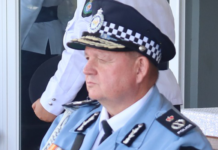This Content Is Only For Subscribers
Opposition MP Māteni Tapueluelu said he was saddened by what appeared to be Speaker Lord Fakafanua’s disregard for some important advice from the former Chief Justice that he should have followed while he conducted last week’s vote of no confidence motion.

Hon. Tapueluelu was referring to a Supreme Court decision in which he was recently granted leave to sue the Parliament in relation to an alleged illegal pay rise.
He said the former Chief Justice Whitten found that the Parliament had failed to make its decision for the pay rise according to the Rules of Procedure of the Legislative Assembly number 79 which said that reports by the Standing Committees regarding the pay rise must refer to Parliament for “debate and vote”.
Instead, the Parliament’s resolutions in response to the reports were communicated to the Members in the form of circulars delivered to their homes for them to tick and sign their names to express agreement. The circulars were neither a motion nor a resolution, the judge said.
Hon. Tapueluelu said he strongly believe the Speaker Lord Fakafanua had made the same mistake last week when he did not allow the House to debate the 46 motions and their corresponding responses read out as part of the vote of no confidence in the Prime Minister.
He said the Assembly’s rule 62 (2) said that “A motion shall be put forth with without debate – (a) if the Speaker or the Chairman is of the opinion that a question has been sufficiently debated.”
Motions vs circulars
Hon. Tapueluelu argued that the 46 motions and their corresponding responses from the Prime Minister which were read out in the House could not be regarded as debates. They were just like questions and answers.
He said this meant that after the reading the Speaker should have used rule 62 (2) (a) which pointed out that the 46 accusations and the corresponding answers from the Prime Minister must be “sufficiently debated” until the Speaker was satisfied the issues had well been clarified before he put it into a ballot.
READ MORE:
- Chief Clerk responds to ‘secret meeting’ concerns, but Lord Fakafanua refuses to answer Kaniva News’queries
- Dr Eke reveals details of secret meeting called by Speaker to stop MPs from debating PM’s response to his motions of vote of no confidence
- Parl’t postpones to enable MPs to ‘urgently’ file legal actions against Speaker following vote of no confidence dispute
- Critics pick on Speaker’s “not taking side” comment during vote of no confidence dispute in Parliament
“What really concerns me is that although we and the court could interpret the rules and constitution differently, it is the court which normally has the final say. The court has already made its decision on the same rules 62 (2) about a motion in Parliament”, Hon Tapueluelu told Kaniva News.
He said the court has already made its recommendation on rule 62 and reminded the Parliament that a “motion must be debated”.
“If we look at Justice Whitten’s decision, the problem with the circulars is that no MP can debate or speak and express his opinions on what message provided in the circulars before the Speaker could make his conclusion.
“In my view, it is the same scenario which applies to the vote of no confidence motion. Last week, no one was allowed to speak and express his opinion in the House regarding the 46 motions and answers. It was just the clerks who spoke and read out the motions and they were not MPs,” Hon Tapueluelu said.
He also said that rule 48 provides the right of MPs to reply.
Rule 48 (1) says “A member who has made a substantive motion shall have a right of reply”.
Tapueluelu said: “All 10 of us MPs who submitted the motion of no confidence were not allowed to reply”.
Ten-minute promise
He said the Speaker told the House the day before the no confidence motion was balloted that he would allow MPs to debate the accusations and the corresponding answers for 10 minutes each.
“That’s rule 38 (1) (a) under which a member may speak for no more than 10 minutes during a debate”, Tapueluelu said.
This meant a Member could speak more than one time, but for no longer that 10 minutes.
That 10 minutes promise for a chance to debate on the motions and answers was not given before the MPs voted on the no confidence motion.
After the reading of the motions, and while the Opposition members were expecting a debate, the Prime Minister moved for the Speaker to let the House ballot on his vote of no confidence.
While the Opposition opposed the Prime Minister’s ballot move some of them began raising some issues they claimed were inaccuracies in the Prime Minister’s 46 response, but they were immediately warned by the Speaker that they were not allowed to debate those issues. He said they were only allowed to show their opinion on the Prime Minister’s motion for a ballot.
“So where is the chance for us to debate then?” Hon. Tapueluelu asked.
Secret meeting not representative
He said the “secret meeting” between the Speaker, the Prime Minister and Hon. Eke before the House returned to finalise the vote of no confidence session on Wednesday appeared to be a move by Lord Fakafanua to justify his second decision to withdraw his promise for the House to debate the 46 responses from the Prime Ministers.
As we reported earlier this week, most of the 10 Opposition MPs, who submitted the vote of no confidence motion were unaware of that special meeting.
The Chief Clerk told us yesterday that the controversial meeting between the Speaker, the Prime Minister and Tongatapu 5 MP Eke on Wednesday was a normal way of meeting used when an MP had something to raise with the Speaker.
She said the details of such meeting would not be released during Parliamentary sessions in order to allow MPs to feel confident in raising any issues with the Speaker.
Hon. Tapueluelu weighed in and said MPs could meet with the Speaker at any time. However, he said he wanted to make it clear that the Speaker’s meeting with Hon. Hu’akavameiliku and Hon. Eke was part of an important issue which was currently being debated in the House and it should have been declared by the Speaker right at the beginning when the House returned from lunch.
“The other thing is that that meeting was not representative as there were 10 of us altogether who signed the motion,” Hon. Tapueluelu told Kaniva News.
Hon. Eke submitted the motion because according to the law only one MP could lodge the submission, but the 10 MPs all contributed to the content of the motions, he said.







